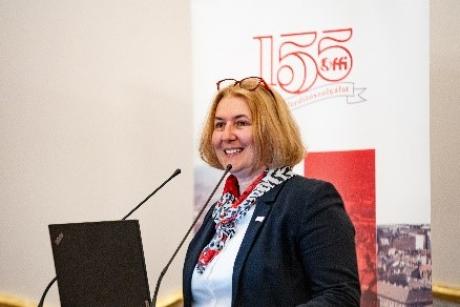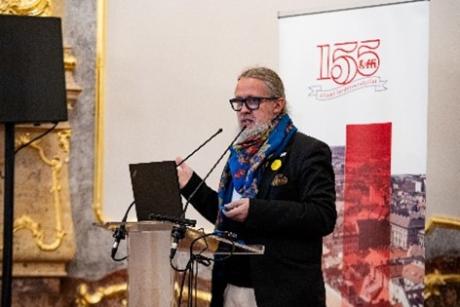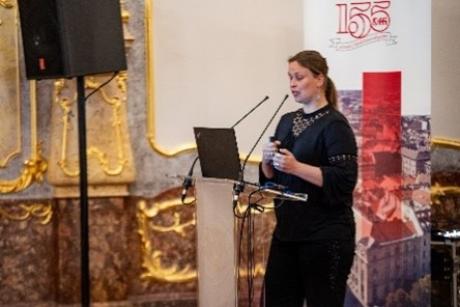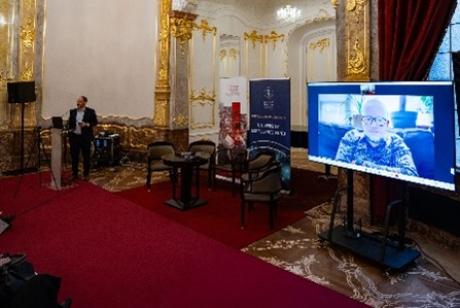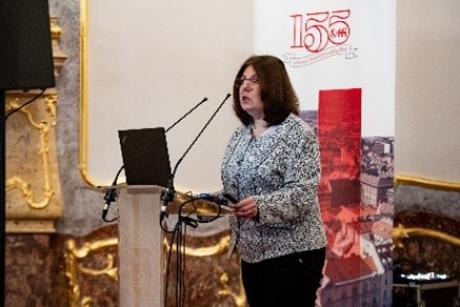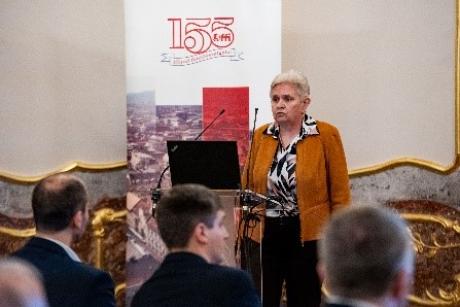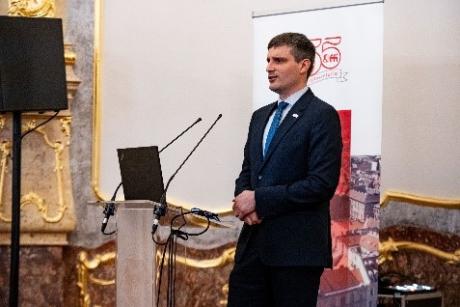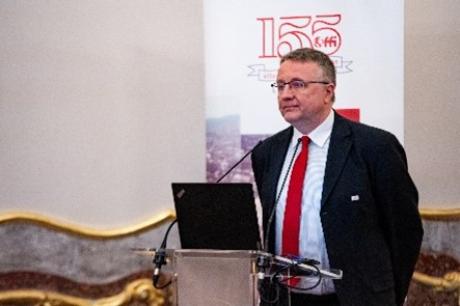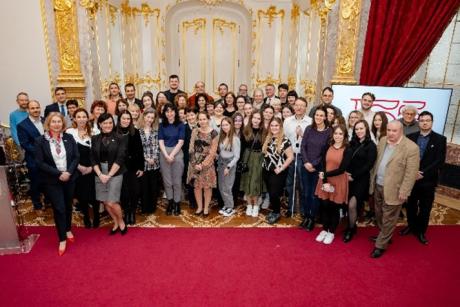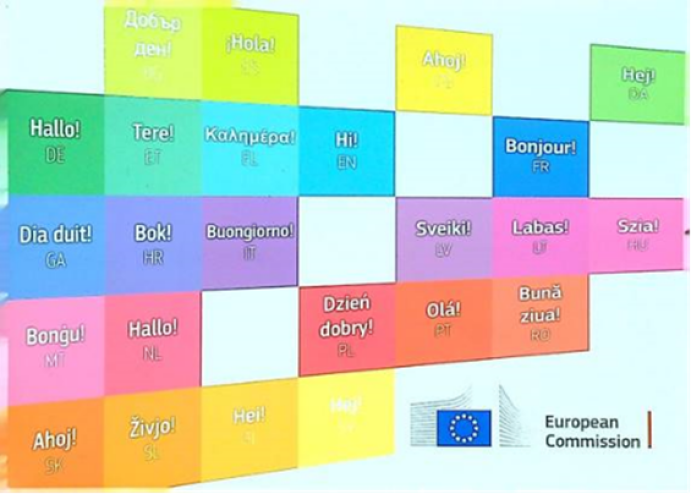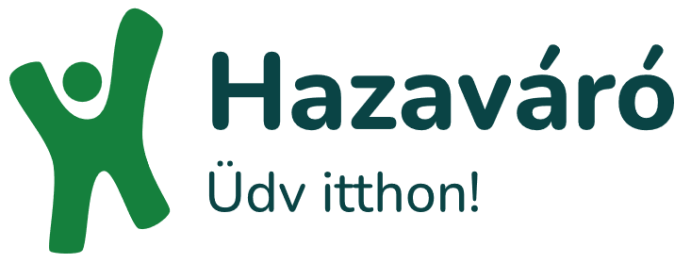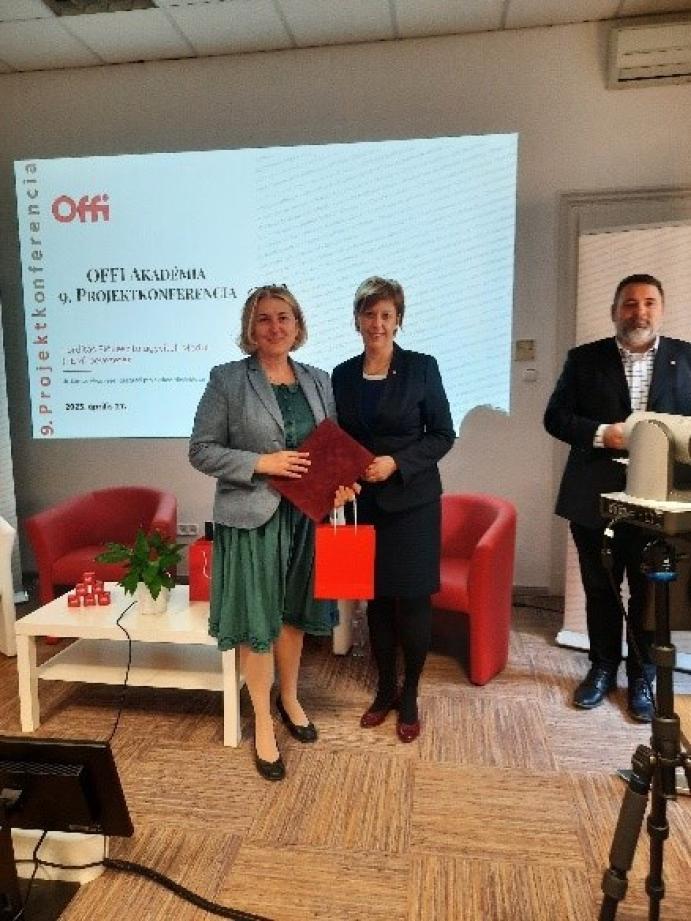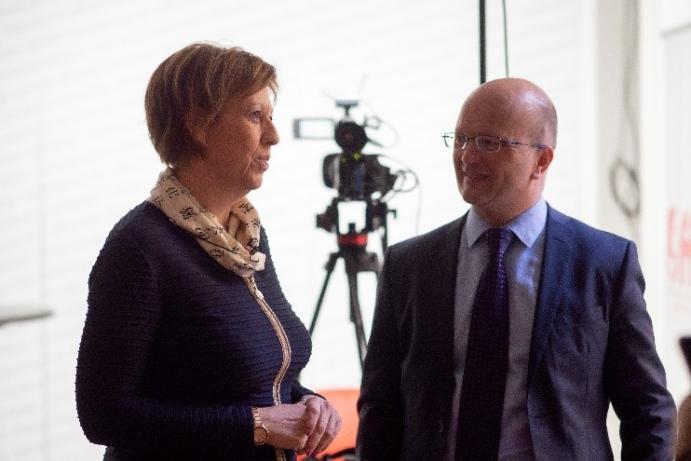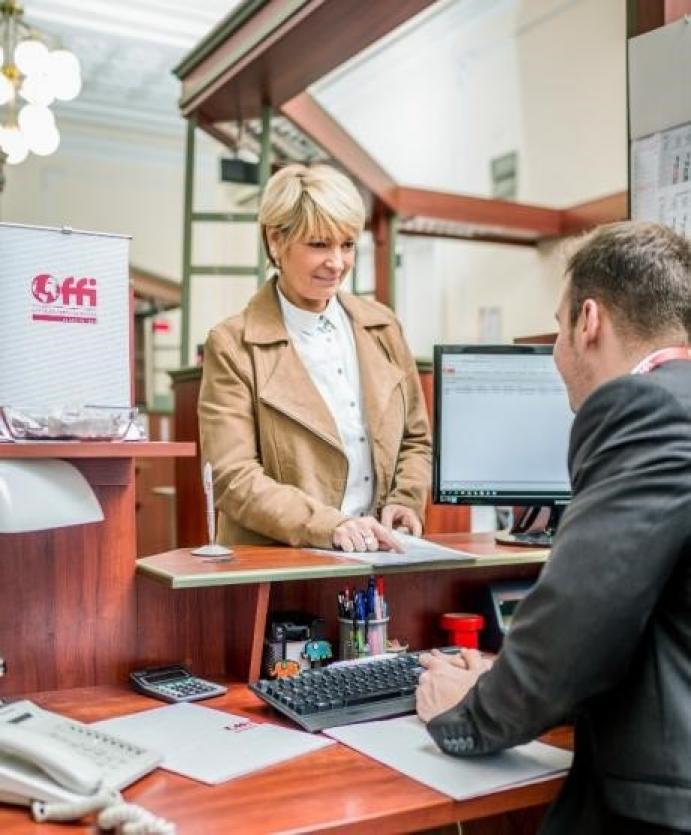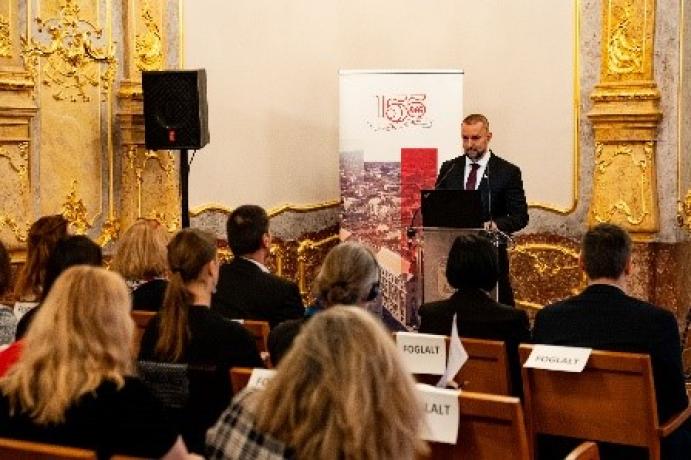
Summary of the 26th Translation Studies Conference
On 22 March 2024, OFFI Zrt. organised an international conference entitled High-Quality and Competitive Language Mediation in the Public Sector in cooperation with the Department of Translation and Interpreting of the Faculty of Humanities of Eötvös Loránd University. Ministerial Commissioner Balázs Németh, the CEO of OFFI Zrt., gave a welcome speech at the conference, in which he conveyed the greetings of Dr Bence Tuzson, Minister of Justice, and then gave a special welcome to the conference speakers from the USA, Sweden, Austria, Romania, Slovakia and Serbia. He pointed out that in 2024, the organisation celebrates the 155th anniversary of the State Translation Services at this conference, and highlighted how the events of the past 155 years have contributed to the preservation of the traditions of forensic translation in Hungary, while the organisation has always been able to find the solutions to the challenges in the translation industry of the different eras. The presentation also highlighted OFFI’s focus on public services and the fact that today OFFI has become a state-of-the-art organisation. Speaking about the future vision of OFFI Zrt., he said that he intended to allow the state to make more effective use of the competences available to the organisation.
Dr Szilvia Szoták, the professional leader of OFFI Zrt., recalled the 2019 anniversary conference, which took place in the Upper House Chamber of the Parliament, and presented the innovative solutions of the past five years. She highlighted the renewed trainee and mentoring programme, the plans to expand the IUSTerm legal and terminology database and integrate it into the translation process, the innovations in using CAT tools and the automation of the template preparing process. She pointed out that all these innovative processes support working at a high level. She also mentioned the in-house professional training of the Translation and Revision Department and how the OFFI-specific e-learning course developed jointly with the University of Szeged can be used in translator training.
Henrik Nilsson, President of the European Association for Terminology (EAFT), gave a plenary speech at the conference. In his presentation he outlined the activities and objectives of EAFT. The focus of his presentation was on the relationship between terminology and (linguistic) mediation. He stressed that the emphasis in mediation is on promoting intercultural understanding. In addition to mediation at textual level (translation/interpretation), there is also a need to talk about conceptual and communicative mediation – and here is where terminology, as an indispensable tool for mediation, comes into the picture: we can talk about terminology mediation and terminological mediation. The former can take place between languages, between experts and lay people, and between subject areas. The latter is key to communication between experts, between people and machines, and between machines and systems. Having clarified these concepts, he then moved on to the roles of terminologists, terminology workers and translator terminologists, reflecting on the inevitability of translation-oriented terminology. In this context, he presented the practical steps of translation-oriented terminology work and the related responsibilities and competences expected of the participants. He concluded that the application of a terminological approach and methods in the workflow is an essential component of a reliable, high-quality translation. The terminologist is a catalyst, a mediator and a facilitator.
In her speech entitled Unlocking the Potential of ChatGPT for Translation and Terminology Training Barbara Heinisch (University of Vienna, Centre for Translation Studies) gave a brief overview of the ways in which ChatGPT can be used in translation, with varying quality in different languages. She found that ChatGPT can be used as a tool for inspiration, for stylistic enhancement of translations, for finding synonyms, for detecting errors, for context search, and for simplifying and summarising the text. From the perspective of terminology, she found that ChatGPT may be useful for explaining terms, for term creation and extraction, for identifying domains and for creating concept nets. However, a drawback in the field of teaching of terminology studies was that ChatGPT does not always produce reliable results and students are generally unable to judge the correctness of the definitions given for a term due to a lack of professional competence. She pointed out that the University of Vienna has published an online manual on the use of artificial intelligence to support the work of teachers.
Arle Lommel, Senior Analyst at the US market research institute CSA Research, gave a presentation on the concept of AI and authenticity and their relationship, entitled The Authenticity of Translation in the Age of AI. He limited the concept of AI to neural technologies that draw conclusions from large amounts of learning material and mimic human behaviour based on that information. Authenticity is mostly understood as correctness and accuracy, i.e. the translation says the same thing in the same way as the author intended in the source text. The authenticity of a translation depends on the purpose of the translation. There are many possible authentic solutions for a given translation problem, but whatever AI technology is used, it is still the task and responsibility of human translators to choose one or the other. The speaker believes that new workflows combining human and machine activities will emerge in time in the language industry. In his view, the issue of authenticity is an unintelligible concept for artificial intelligence.
Krisztina Sárosi-Márdirosz, Adjunct Professor at the Hungarian University of Transylvania (SAPIENTIA), presented the process of official translation in Romania. The legal status of official translators in Romania is regulated by Act 178 of 1997, while the provisions on the acquisition of the status of official translator were amended by Act 76 of 2016. She explained that, according to the legal provisions, a translator's licence can be obtained by those who have graduated in foreign languages from a faculty of humanities, and, in the case of a specific the foreign language, by those who have passed a school-leaving examination in their mother tongue other than Romanian (for example, in a Hungarian or German minority secondary schools) and have passed a translation examination at the Ministry of Culture in Bucharest. The translation licence is issued by the Ministry of Justice in each case. It is possible to obtain a translator's licence in a number of specialised fields, but for the legal field you need to have passed a translation examination. A distinction is made between official and certified translation.
In her presentation entitled Certified Translation and the Situation of Certified Translators in Slovakia, Gizella Szabómihály (Constantine the Philosopher University of Nitra) explained that the status of certified interpreters and translators in Slovakia is regulated by Act 382/2004 on Judicial Experts, Interpreters and Translators and its implementing Decree No. 228/2018 of the Ministry of Justice. She dedcribed the practice of preparing certified translations, according to which in Slovakia, only professionals registered in the register of the Ministry of Justice may provide certified translations. The register is public and contains the names, place of residence, registration number, working languages, date of inclusion in the register and details of the compulsory liability insurance of translators. Translators keep an electronic logbook of their translations, which can be accessed via the website of the Ministry of Justice.
In his presentation focusing on the challenges of preparing certified translations in Serbia, Emil Lulić, head of the Office of the Hungarian National Council of Vojvodina, described how translators in Serbia face similar challenges to those in neighbouring countries, which are, however, unknown in Hungary. Challenges include the lack of adequate regulation of the status of translators (the only regulation in this field is the Regulation on Permanent Court Interpreters, adopted in 2010), the lack of clarity in the existing regulations concerning the distinction between translators and interpreters, the determination of remuneration rates and the division of subject-matter specialisations between translators. The situation is further complicated by the existence of two separate registers of translators, the system of requirements for supervising translators’ competences and the ad hoc nature of quality control.
Zsolt Varga, a German reviser at OFFI Zrt., delivered a presentation on Court Interpreting and Authentic Translation in Austria. He first gave an overview of the historical and legal milestones in the field of translation/interpreting in Austria, and then introduced the current legal provisions. The Austrian Association of Generally Sworn and Court Certified Interpreters was founded in Austria on 17 September 1920. The speaker described the concept of a "generally sworn" court interpreter: when taking office, court interpreters are sworn in only once for all the proceedings in which they will act as interpreters, as opposed to interpreters who, in exceptional cases, are sworn in once, only for one specific proceeding. The amendment of the legislation on 1 January 1999 introduced the concept of "certification by a court" to supplement the general swearing-in, which refers to an interpreter/translator who has undergone a quality assurance procedure to certify his/her professional qualifications.
The presentations were followed by a round-table discussion chaired by Szilvia Szoták on current challenges facing the translation industry, including the impact of AI-based solutions and the relationship between AI and quality assurance policy. The discussion was attended by MFTE Co-President Tamás Grosser, Proford President Miklós Bán, SZOFT President Patrícia Beták, and Levente Péter Nagy, a reviser at OFFI.
The conference ended with two book launches: Terminology Strategy and Basic Legal Terms in Dutch, Russian, Spanish and Portuguese edited by Dóra Mária Tamás and Introduction to Translation and Interpreting Research Methodology II edited by Kinga Klaudy, Edina Robin and Olívia Seidl-Péch were introduced by the authors including Márta Kántor Faragó (University of Debrecen), Eszter Sermann (University of Szeged), György Miklós Palásthy (OFFI), Dóra Mária Tamás (OFFI), Kinga Klaudy (Eötvös Loránd University), Olívia Seidl-Péch (Eötvös Loránd University), Márta Lesznyák (University of Szeged), Ágota Fóris (Károli Gáspár University of the Reformed Church) and Mária Bakti (University of Szeged).
Thank you for joining us at our conference. We hope that you enjoyed the event and found it valuable.
